This post may contain affiliate links. Please read our disclosure policy.

In the past week, I’ve read several studies that are scary to me… it’s the scary truth about what’s hurting our kids. We all know that what our kids hear becomes their inner voice, but it’s hard to control what they hear from others, isn’t it?
CNN recently interviewed Dr. Jean Twenge, author of iGen and her interview worried me – because I saw the truth that I would be facing in just a few short years as my oldest son would enter high school and I would be parenting teens and elementary ages kids too. Dr. Twenge started doing research 25 years ago on generational differences, but when 2011 -2012 hit, she saw something that would scare her to the core. This is the year when everyone had video games and those having iPhones went over the 50% mark.
Think about what that really means: it was when people began to have access to the digital world. Social media took off, sending videos & photos increased (along with feelings of being left out). The line that separated our home lives from our school/work & social lives became very blurred.
The results of that showed teen behavior that should scare all of us.
- This was the year that more kids started to say that they felt “sad, hopeless, useless… that they couldn’t do anything right (depression).”
- They had frequent mood swings.
- They felt left-out and lonely.
- The depression rate is rising even faster among millennials (up 47 percent) and adolescents (up 47 percent for boys and up 65 percent for girls. (source: BCBS report)
- Depression Diagnoses of major depression are rising fastest among those under age 35.
- Depression Diagnoses have increased 47% since 2013 among millennials (ages 18–34).”
- A substantial increase in suicide rate.
Before I give you any more info, I want you to look at these graphs of what could be considered negative behaviors and look at how the information correlates to the iPhones being released.
They aren’t hanging out with friends nearly as much.
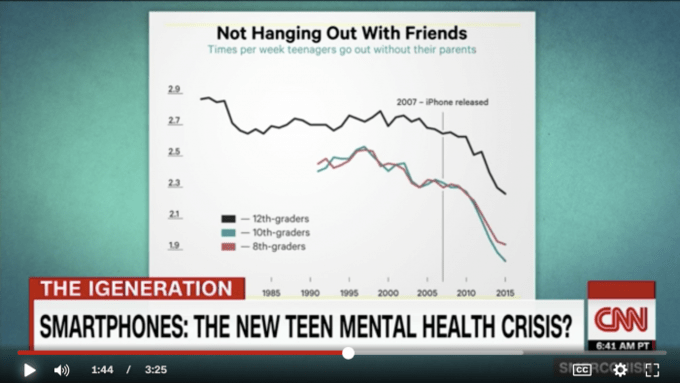
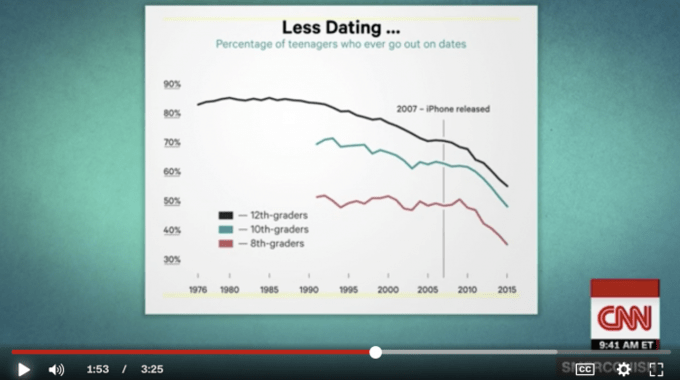
They aren’t dating as much in their teen years.
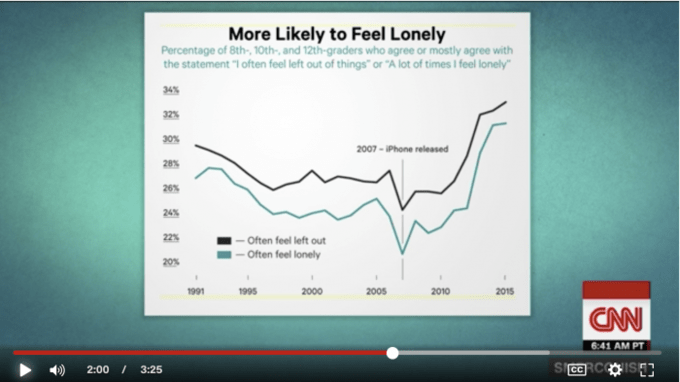
More likely to feel lonely in their teen years.
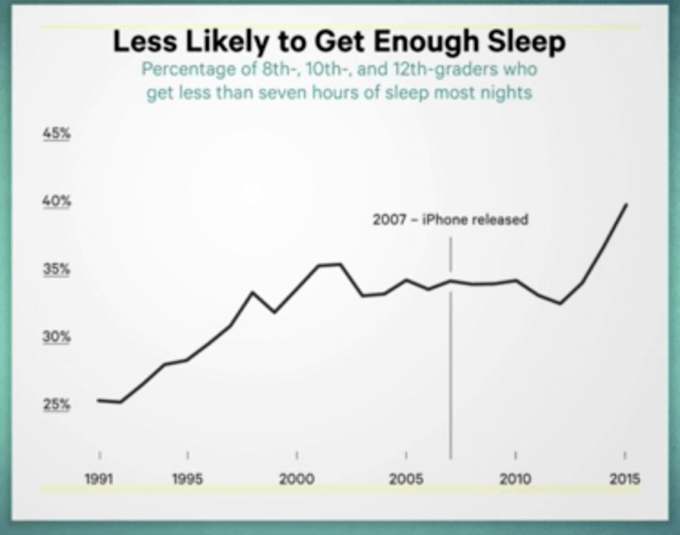
They are getting less sleep.
She goes on to say that we are in the worst mental health crisis in decades. You can get her book, iGen, with my Amazon affiliate link here, to read the rest of her findings.
Why is this happening? Why are kids more depressed because of electronics?
Think about when we were in school – we didn’t know every time that there was a get-together that we weren’t invited to and we didn’t see pictures of each outing, game, or party.
We didn’t care what we looked like when we were hanging out with friends in my teenage years, because we were the only ones that were there- I can remember sitting around with my best friends in our sweatpants, just laughing – I didn’t wear makeup or care if I had my hair fixed just right, because the worry of a phone or camera wasn’t there.
Think about bullies.
When we left school, we left them. If teasing happened, it didn’t happen at home. It didn’t happen so publicly. Everyone couldn’t see it or know what they were teasing other kids about since they weren’t there.
Now, it’s all public knowledge, and our kids’ peer group can join in or watch. It’s horrifying.
I can’t imagine being a tween or teenager now. Although- as the parents of children, we have to believe it, because we have to help our children navigate it. And the parents and teen relationship is much more difficult. It’s hard to be a role model and encourage your teen when you have difficulty relating, and raising teenage boys and girls well has never been important.
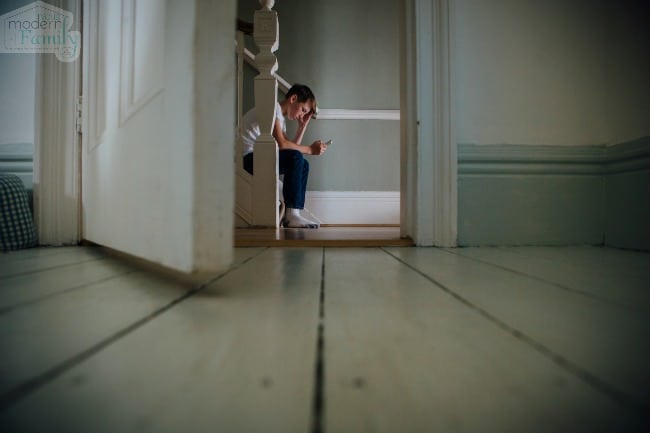
According to Victoria Prooday, Occupational Therapist & writer at YourOT.com, “There is a silent tragedy developing right now, in our homes, and it concerns our most precious jewels – our children… Researchers have been releasing alarming statistics on a sharp and steady increase in kids’ mental illness, which is now reaching epidemic proportions:
- 1 in 5 children has mental health problems
- 43% increase in ADHD
- 37% increase in teen depression
- 100% increase in the suicide rate in kids 10-14 years old“
She goes on to say that “Today’s children are being deprived of the fundamentals of a healthy childhood:
- Emotionally available parents that stay connected
- Conversations that included eye contact
- Clearly defined limits and guidance
- Responsibilities
- Balanced nutrition and adequate sleep
- Movement and outdoors
- Creative play, social interaction, opportunities for unstructured times and boredom
Instead, children are being served with:
- Digitally distracted parents
- Indulgent parents who let their teenage sons and daughters “Rule the world”
- A sense of entitlement rather than responsibility
- Inadequate sleep and unbalanced nutrition
- Sedentary indoor lifestyle
- Easier access to drugs and alcohol that can lead to substance abuse
- Endless stimulation, technological babysitters, instant gratification, and absence of dull moments”
How true… and how sad.
You can read the rest of her story and more at yourot.com
I couldn’t agree more. According to TIME.com, “Despite the rise in teen depression, the study, which analyzed data from the National Surveys on Drug Use and Health, reported that there wasn’t a corresponding increase in mental health treatment for adolescents and young adults. Researchers said this is an indication that there is a growing number of young people who are under-treated or not treated at all for their symptoms.”
The article goes on to say that it’s not just how our teens behave and feel, it’s young kids – in elementary school. School Counselors like Ellen Chance in Palm Beach say they see evidence that technology and online bullying are affecting kids’ mental health as young as fifth grade, particularly girls.
“I couldn’t tell you how many students are being malicious to each other over Instagram. “I’ve had cases where girls don’t come to school, and they are cutting themselves and becoming severely depressed because they feel outcasted and targeted.” She says she now sees cutting incidents pretty much weekly at her elementary school, and while they vary in severity, it’s a signal that not all is right.”
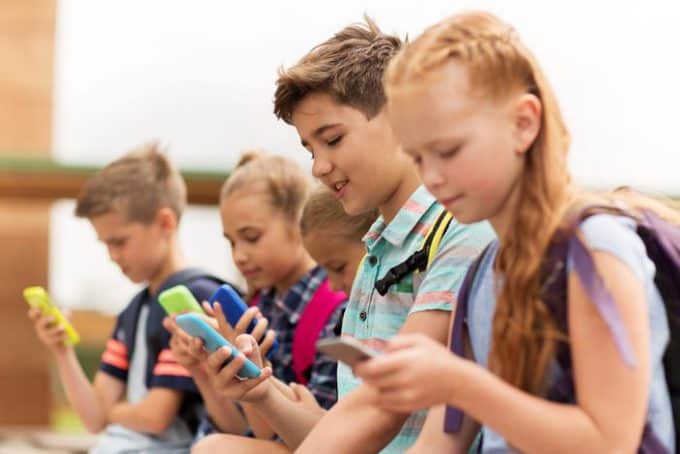
What can we do about it?
1. Swap Chores for Screentime
Responsibilities increase their self-worth. Example: if you don’t set the table, we can’t eat. If you don’t wash your clothes, you will have nothing to wear tomorrow:
“To develop a high self-esteem a person needs a purpose. A key component to high self-esteem relies on how you view yourself regarding contribution. In other words, in the child development process, chores are a big role in a kid’s self-esteem.” ~Impact Parenting.
Swap Chores for Screen Time. If they want to have screen time, they need to pitch in first.
They need to learn that work comes before play. This will drastically cut back on their electronic time without any nagging or yelling from you. You can purchase the cards here.
2. The AAP now suggests screening all children for depression starting at age 11.
3. Get back to what we did before phones (back to what our parents did when we were young)… spend time playing games with our kids.
4. Spend dinnertime talking.
5. Drop everything that you are doing when your kids get home from school to TALK to them.
6. Make dinner without having the TV on, the phone close by, or the tablet tuned into something.
7. Use any ‘car time’ to talk to our kids (maybe even by not allowing electronics in the car)
8. Be sure that your child is getting enough hours of sleep. This is a substantial contributing factor.
9. Don’t keep a lot of junk food in the house. Limit junk food & replace it with fruits & vegetables. If your child is picky, they can certainly find a fruit or vegetable that they like. (I’ve taught our kids to make smoothies, too, but they have to clean up after themselves, or they lose the privilege of using the blender… they LOVE to make them, so this is a consequence that they will not want to be placed on them).
10.
Join the one-on-one time challenge (30 days) for FREE.
11. Have a no-tech week and tell your kids to “go play!” Don’t feel the need to always play with them. My job, as a play therapist, is to teach parents how to play with their kids to help them, so while I always think that playing with your kids is a good idea, but I also want them to play alone. I want them to learn how to keep themselves entertained.
12. From the time that our kids were very young, I gave them time to entertain themselves, and now they are able to find ways to keep themselves busy (drawing, playing, building, etc..)
13. Don’t rescue your kids. Here’s a recent example that happened in our house:
I’ve started having our kids pack their lunches (with my supervision), but yesterday one of our sons decided to wait.. .and wait… and wait. When it was down to 10 minutes before leaving, he asked me to pack it.
I said no, and he then asked for lunch money.
I said, “I think it’s upstairs in your piggy bank if you have some in there.” His face said it all. I wasn’t going to buy him out of this. It was his responsibility.
It is NEVER easy to teach our kids these lessons, but they serve our kids well. He quickly made himself lunch and was on his way. He learned a valuable life lesson about preparing himself for the day.
14. Talk to your kids about why they need to come to you if something is wrong. I talk to our kids about all of this, and they know that I would do anything to help them. I say it daily… “If you are ever feeling sad or left out about something and it becomes too big for you to handle easily, come to me.”
Yes, it’s a lot to tell them, but it is the truth. I need them to know it. It’s not a joking matter, and it’s not one to take lightly. Talk to your kids TODAY.
15. Make a rule with yourself that you will limit YOUR online distractions when your kids are home. Set a time that you can put electronics away… for example: Make 3:30-9:00 a no-tech time for you, the parent. (or whatever hours your kids are home). It will not only benefit your kids, but it will help you, too.
Yes, it’s the scary truth about what’s hurting our kids, but we have the power to help.
Here are more posts you might like:
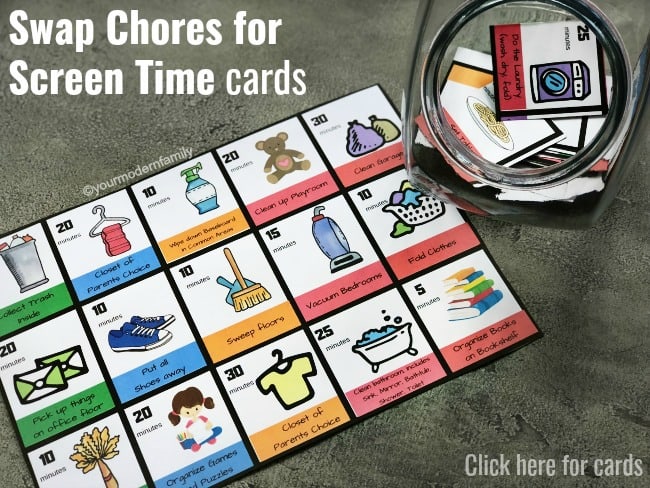


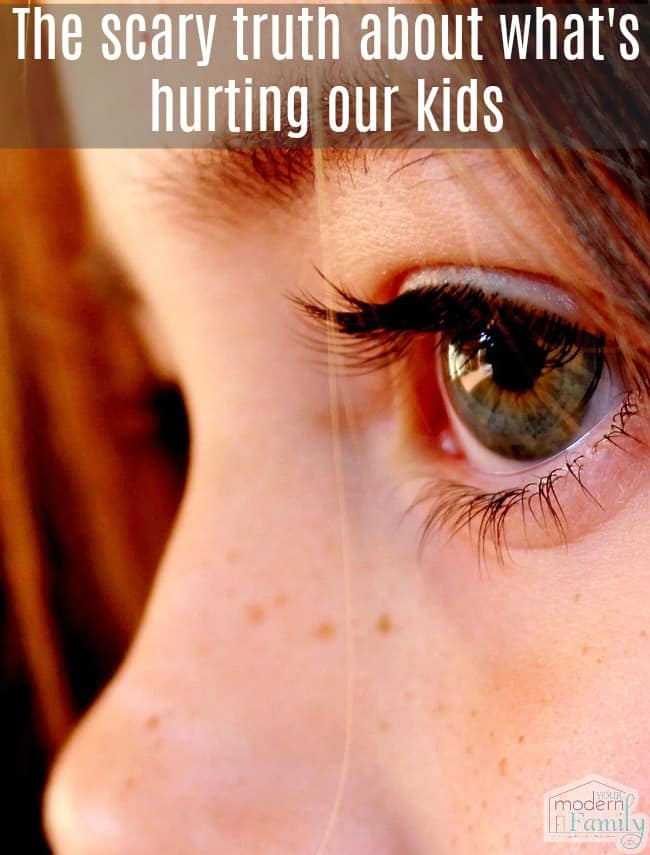














Hi I’m a child. I really do understand this article. I have to i courage a lot of my friends into school or to be happy at school. People don’t look at the importance of life and the problems that the world is facing. The biggest ptoblem is my phone broke or Instagram has shut down. I’m not saying that I don’t love technology but there needs to be and balance about technology and getting out and enjoying the world.
Do not blame the iPhone for the problems with our kids, blame our society for not learning how to use this new technology. Blaming the iPhone is akin to blaming the invention of the wheel for all the accidents on our streets and highways nowadays. Society needs to learn and understand how to use new technology, it isn’t a matter of just learning how it works, but to understand how it will affect our daily lives. There are many “experts” that come out of the woodwork with their theories on the matter mentioned above but in reality it’s our misunderstanding that leads us to confusion.
As the mother of an almost 13 year old and 9 year old I find this article timely. I have never felt it was a good fit for our family to have a video gaming system, but I struggle with knowing when the time is right for teens to have a phone. My 12 year old is convinced that she’s the “only” one in her class without a smart phone. I have no problem sying no, or with my children being different, however, would love some insight as to the right age.
What have we come to? You have to learn how to play with your kids. My kids played with each other and we hung out. I didnt per say “play”, but I was there watching and cheering them on at games etc. Smh America wake up and just get involved on way or the other!
BTW no one should have a phone that is is under 13 unless they ready and if for protection purposes such as walking home from school etc. There is too much danger to get into on the phone.
I have never read an article like the one above and I am 90 1/2 yrs old. This whole thing makes sense and the more you read it more sense it makes.
I was married and am widowed now and had 4 good kids – they drove me up a wall but nothing bad or terrible like the kids today. They were just regular normal kids.
I now have 8 grandkids 4 boys & 4 girls. But what you say in this article I can see it in some of my grandkids. Something I saw long time ago but never said anything to anyone,but tried to talk to them but, they never listened to me because, I guess they thought I was an old grandma and wasn’t with it today.
I can say it isn’t too late to try and make it better. My grandkids and all kids are in my daily prayers and with the help of God we might get thru this whole thing.
I have a question. It’s hard when you don’t have kids together and I have my son full time and my husband has his two younger kids part time and that’s on the wknds and me and my husband came up with this rule no cell phone when you come home from school but can be on the games or laptop or iPad and now my husband said that no cell during the week on school night but can have your cell phone on the wknds
a real spiritual activity could help these young people, especially if they can achieve real spiritual development
This was a very thought provoking article. Having lived in Arlington VA and now in Portland OR I am amazed at the differences. Back East I saw few kids outside playing and a lot of CPB (ell phone babysitting), Here in Oregon I see more kids outside playing and in restaurants the parents are more engaged with their children. Not a value judgment just an observation. This statistics in this study shows the need for more school counselors at every level. As the psycho-social needs of children increase a school counselor is trained to help kids with not only their individual issues, but also can work in groups on bullying. I can’t emphasize the need for this enough.
This is not just an issue for children. Look at all the adults on their phones not even looking at each other or sometimes where they are walking. I have a smart phone and I do use it. But look around just about anywhere and you will see a lot of people glued to their phones. I agree it does affect kids but also adults. I think it affects kids more since they are still growing and learning. If kids see their parents or other adults or their friends, they will copy them.
I miss my daughter. Great article. My younger daughter lives about 2 hours away and wanted me to come over. She was lonely. So I drove over and got there by 2PM. She sat with me and texted for 45 minutes before I finally got up and said, well I have to get going now so I won’t hit rush hour. She said she just had to reply to some texts and then was going to talk with me. She missed me so much and was so upset, but I told her I had to leave at three. So I hugged her and cried all the way home.
This is the best and most helpful article! You have pointed out so many wise tips that should really just be common sense but maybe we forget about as modern day parents trying to keep up with the hustle and bustle of everything. Sometimes life gets overwhelming, managing work and family, keeping up with the Jones’s, and keeping our children happy and healthy at the same time… well, whew!!! But you are so right! Let’s bring things back to basics. Back to face to face time, human interaction, valuable time and communication, and the good outdoors. It’s not complicated or time consuming either. Your calendar of activities is a great example of fun, inexpensive, and stress free ideas. Plus all that time without the electronics will actually amaze people with the time they have for other things! All the best.
I think it should be noted that 2007 is also when the recession first hit. This might be a big contributor as well!
I am a teacher and parent of two boys younger than 4….this is all so sad and true. I want to share this very much! Is there any way I could get this blog post in a printable format with the links listed at the end? I would love to share this with my student’s parents at conference time! Thanks.
https://docs.google.com/document/d/1eTlcjYN-rWKp3FdjUqlZP_JIZc286T_ZN5sgOQMnCN0/edit?usp=sharing
I had 3 kids in 4 years in the late 90’s. We used to turn the TV off for 1 month in the summer, cancel our satellite subscription. We still have the old videos on the VCR to watch if they were desperate, Then we had a list on the back of the bedroom door of cool things we wanted to do, bike to a certain place, have a epic water fight, picnic, build a fort. And we would try and cross off as many as we could over the summer. Those were great years. We didn’t let them get phones until they were 16 and I have never paid a cent toward a phone for them. I don’t own a phone. We camped for family vacations. We lived in the country. We ate supper around the table every night without the TV on. But for us it didn’t work, my children think that how everyone else is living is better. That life of party’s and drugs is more fun. and now they are glued to their phones. I thought t we were in touch and aware, we were here, we were present. But now I have addiction and mental health living in my house where my children were.
While I am certain that technology and the age of anonymous cyber bullies has played a part in childhood depression why is no one talking about the age of Teach-to-Test that all happened about the same time when schools drastically changed to teach for testing and many dropped important education like the arts and real literature based curriculum?